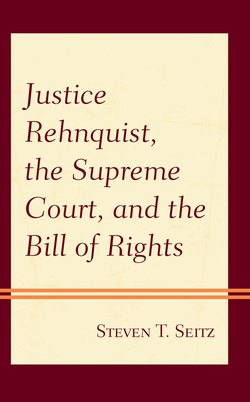Читать книгу Justice Rehnquist, the Supreme Court, and the Bill of Rights - Steven T. Seitz - Страница 33
На сайте Литреса книга снята с продажи.
Master/Slave
ОглавлениеThe master/slave relation bears interesting similarities to the cross-border insurance problem in Allgeyer v. Louisiana, 165 U.S. 578 (1897). The insurance company had headquarters in New York and issued an open marine insurance policy for merchandise shipped from New Orleans. The state of Louisiana statute required all issuers to comply with all applicable Louisiana laws, found the insurer negligent, and fined it several thousand dollars. The defendants argued that the Louisiana statute deprived them of property without due process of law and denied them equal protection of the law. The plaintiff won in the lower state court but lost on one count in the state supreme court. The plaintiff-in-error asked for SCOTUS review.
The Louisiana Supreme Court agreed at the outset that a contract valid in New York was also valid elsewhere. The insurance company did not have a representative in Louisiana, so it was the act of sending by mail or telegram notice of shipment and assignment of its value against an open marine contract that violated the Louisiana act. SCOTUS distinguished a contract made within a state in Hooper v. California, 155 U. S. 648 (1895) and one made without. Even the Louisiana Supreme Court noticed an apparent interference with the defendant’s liberty. The insurance company made no contracts in Louisiana and thus had no duty to observe Louisiana obligations. SCOTUS found the Louisiana requirements a violation of the defendant-in-error’s liberty without due process.
The “liberty” mentioned in that amendment means not only the right of the citizen to be free from the mere physical restraint of his person, as by incarceration, but the term is deemed to embrace the right of the citizen to be free in the enjoyment of all his faculties, to be free to use them in all lawful ways, to live and work where he will, to earn his livelihood by any lawful calling, to pursue any livelihood or avocation, and for that purpose to enter into all contracts which may be proper, necessary, and essential to his carrying out to a successful conclusion the purposes above mentioned.
The defendant made a valid contract outside of the state and performable outside the state, even though the defendant was temporarily within the instant state. A collateral act performed pursuant to a valid contract does not give a state power over that act. SCOTUS developed this logic under the 14th Amendment, which did not exist when Taney wrote the Scott decision. What did prevail was the initial sentiment of the Louisiana Court that a contract valid in one state was valid in another. Typical of the later Lochner period, liberty of contract superseded state boundaries. SCOTUS agreed. This pre-Civil War logic implicitly or explicitly elevated the logic of full faith and credit to its original intention, where the terms of a contract properly executed anywhere are valid everywhere.
